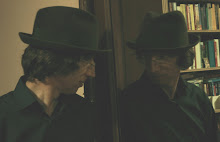Coming to a channel near you soon...
Location: Lake Baikal, Siberia
Date: August 2008
Accommodation: intimate double room (canvas) in al fresco surroundings, fully air-conditioned with built-in shower (cold)
Kitchen: portable, with accompanying self-assembly dining area. Open-top stove with easy access to free and plentiful fuel (allow one week to dry out). Unique opportunity for communal catering with fellow guests. Food cooked and served in a convenient bucket, tasty hint of woodsmoke and scrumptious garnish of ash and grit. Staff provide regular, free screening service for animal droppings; local wildlife provide convenient pouring holes; beer and Baikalskaya vodka provided by German caterers
Facilities: washing facilities located conveniently nearby, free chilled running water with add-on fridge / beer cooler; shower area in fantastic lakeside setting (ideal for naturists); airy toilet produced from local, rustic materials and set in nearby sylvan location
Work: path construction with wonderful close views of 80 foot cliffs, excellent cardiovascular workout complemented by essential four mile warm-up / warm-down mile walk to worksite
Local environment: beautiful lakeside setting in birch, larch and pine taiga forest. Very friendly insect life, inquisitive small mammals with rapacious appetities, spectacular wildflowers and and vocally impressive birdlife
Required skills: Must be able to simultaneously light fire, fight off insects and cook for 12 others in a torrential thunderstorm. Also require: ability to balance on cliff edges whilst wielding heavy tools; impermeable to water and mud; self-cleaning; can withstand extremes of temperature and excessive woodsmoke inhalation.
Apart from that nothing else is essential (although wood whittling and banya construction skills a would be a bonus).
CAST:
Lara and Tom (UK): glamorous English-educated Finnish princess and her dapper English gent, an amateur ornithologist.
Witold and Robert (Germany): The finest comedy duo since the Two Ronnies these two, sponsored by
Jack Wolfskin, provided many a moment of light relief.

A tall, angular student from Leipzig, Witi never went anywhere without his trusty mug, dangling from his belt for easy access (even when flying). With his amusing English pronunciations and his meticulous manner Witi couldn’t be more German if he tried.
Robbie, on the other hand, couldn’t look more German, with an impressive socks and sandals combo, an ever-present multicoloured bandana and his trusty moon-and-wolves t-shirt. Marvels of modern sartorial design, the latter two items never left his body unless he took one of his frequent skinny dips in the icy waters of the lake. A fan of DIY banyas and nocturnal wood chopping, back home Robbie is usually found helming his beloved tanker, transporting nitric acid along central European waterways.
Karen and Emily (UK): Hailing from the depths of Essex, these two highly-educated sisters couldn’t have had a more testing time getting to the project, something they were keen to share with us all. With a discerning taste in food both could usually be found sporting natty mosquito headresses and smearing themselves in various salves and ointments from Doctor Karen’s medicine bag. When rain set in and mud of Glastonbury proportions threatened these two wisely decided to head for the hills.
Matan (Israel): With an ego too small to fit in the Middle East this egregious chap decided to see the world. A former army officer he lost no time in utilising his backwoodsman skills and imparting his survival-training knowledge. Gifted with a talent for languages Matan also included the near-mythical local Mrs Fix-It, Olga, amongst his friends.
Hana (Czech Republic): A child of the Cold War, warm-hearted Hana recounted some incredible stories of her experiences of life behind the Iron Curtain. Sharing our exasperated sense of fascination for the Russian way of doing things Hana somehow managed to rise above the squalor of camp GBT.
Nadya, Julya, Jul and Lena (Russia): At first keeping largely to themselves our native friends gradually opened up to their Western colleagues.
Clearly enthused by a passion for Baikal, lively Nadya regularly lifted our spirits and never failed to check our porridge for mouse droppings.
Not to be outdone by her senior GBT colleague, Jul is surely set to become the face of Russian tourism. Severobakailsk’s answer to … she was also eager to enlighten the Westerners about the more bewildering aspects of Russian culture and learn new English phrases.
Interpreter Julya provided extra support to her two GBT colleagues, and learnt a little Danish in the process (courtesy of a friendly Viking with an enormous Thor tattoo).
Volunteer Lena, hailing from the fringes of the Altai, proved a fountain of knowledge about her home country, including the local Buryat culture and their continued Shamanistic practices.
Suporting cast
Walk-on cameos were given to a host of passing walkers, including two bedraggled but enthusiastic Austrians; two testosterone-charged Danes; three bickering Germans; a score of wayward Brits and 56 immaculately turned-out Koreans.
Solid support was provided by the inhabitants of GBT camp two, most notably the thirsty Maxim, some friendly chap in a vest and floppy hat and Alexei, who decided to drain Lystvyanka of its vodka and then make the perilous four hour hike home.

The authors retain all rights. Budding TV execs can contact us at the email address above. Payment only in US dollars.
 Today we picked sweet corn at dawn. 6am found us carting 32 crates of 25 cobs through rain sodden crops, the mist and sun rising over tree covered slopes. When it did eventually rise it revealed beautiful arborous mountains and neat rows of soya beans, red beans, carrots and onions.
Today we picked sweet corn at dawn. 6am found us carting 32 crates of 25 cobs through rain sodden crops, the mist and sun rising over tree covered slopes. When it did eventually rise it revealed beautiful arborous mountains and neat rows of soya beans, red beans, carrots and onions. Kenji and Miho, the newly weds we were staying with, kindly gave us a generous insight into a Japanese home: Shoes are left at the door; there are separate slippers for the bathroom (the first indoor compost loo I have ever witnessed); and decisions such as who does the washing up are decided by a game of paper, scissor, stone. Our sleeping quarters were separate. Outside. In a bus covered in hops and filled with insects. Tom sleeps on the backseat, I sleep in the aisle.
Kenji and Miho, the newly weds we were staying with, kindly gave us a generous insight into a Japanese home: Shoes are left at the door; there are separate slippers for the bathroom (the first indoor compost loo I have ever witnessed); and decisions such as who does the washing up are decided by a game of paper, scissor, stone. Our sleeping quarters were separate. Outside. In a bus covered in hops and filled with insects. Tom sleeps on the backseat, I sleep in the aisle. 










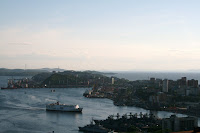.jpg)
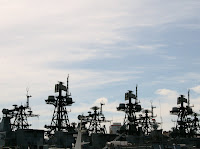.jpg)
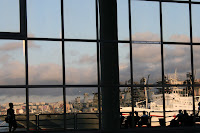.jpg)
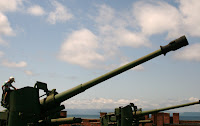.jpg)
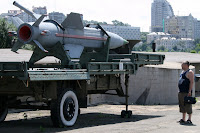.jpg)














